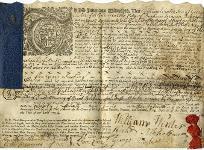Information about apprenticeship records in Durham County Record Office.
Apprentices were of two kinds; trade apprentices and poor or pauper apprentices.
Trade apprentices
Apprenticeship usually started when the child was ten (or seven for the navy) and seldom after eighteen, and lasted seven years or until the age of twenty one.


Apprentices were usually bound by their parents to a master to learn a trade.
From the early eighteenth century indentures were drawn up as evidence of the apprenticeship agreement and they were held by the master and the father, and so are usually lost.
You may find details of apprentices in guild records.
Search the catalogue and type apprenticeship in the Keywords box.
In 1710 a stamp duty was levied on bindings and this caused the establishment of a central register of apprentices kept by the Inland Revenue. The registers are among the Inland Revenue records at The National Archives. You will find indexes to some of the registers with the Society of Genealogists.
Poor apprentices
The Poor Law Act of 1601 gave Churchwardens and Overseers of the Poor the power to apprentice to any trade or husbandry any child under sixteen whose parents or family were unable to provide maintenance.


Until 1757 apprenticeship was by indenture; after that by any properly stamped deed. Before and after that date it was often done merely by agreement and entered in the vestry minute book.
You may find details about parish apprentices recorded in Parish registers, vestry minutes and Overseers’ accounts.
These records were usually kept in the Parish Chest and have been transferred to the Record Office. search the catalogue for apprenticeship records in the Church of England parish collections. Type apprenticeship in the Keywords box and select Ecclesiastical Parish Records from the Category drop-down list.
You will find some useful information about apprenticeship records on the website of The National Archives and on The Workhouse website.


